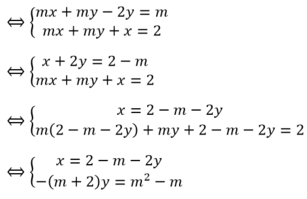Tìm m để hệ phương trình:
{2x - y = 1
{mx + 2y = 2
có nghiệm (x;y) thỏa mãn 2x - 3y = 1
Hãy nhập câu hỏi của bạn vào đây, nếu là tài khoản VIP, bạn sẽ được ưu tiên trả lời.


\(\left\{{}\begin{matrix}3x+y=m+1\\x-2y=5m-2\end{matrix}\right.\Leftrightarrow\left\{{}\begin{matrix}6x+2y=2m+2\\x-2y=5m-2\end{matrix}\right.\Leftrightarrow\left\{{}\begin{matrix}7x=7m\\x-2y=5m-2\end{matrix}\right.\\ \Leftrightarrow\left\{{}\begin{matrix}x=m\\m-2y=5m-2\end{matrix}\right.\Leftrightarrow\left\{{}\begin{matrix}x=m\\y=1-2m\end{matrix}\right.\\ 4x^2-y^2=10\Leftrightarrow4m^2-\left(1-2m\right)^2=10\\ \Leftrightarrow4m^2-4m^2+4m-1=10\\ \Leftrightarrow m=\dfrac{11}{4}\)

1: Khi m=3 thì hệ phương trình (1) trở thành:
\(\left\{{}\begin{matrix}3x-2y=-1\\2x+3y=1\end{matrix}\right.\Leftrightarrow\left\{{}\begin{matrix}x=-\dfrac{1}{13}\\y=\dfrac{5}{13}\end{matrix}\right.\)
2: Khi x=-1/2 và y=2/3 vào hệ phương trình, ta được:
\(\left\{{}\begin{matrix}2\cdot\dfrac{-1}{2}+3\cdot\dfrac{2}{3}=1\\-\dfrac{1}{2}m-\dfrac{4}{3}=-1\end{matrix}\right.\Leftrightarrow m\cdot\dfrac{-1}{2}=\dfrac{1}{3}\)
hay m=-2/3


Kết hợp điều kiện đề bài và pt thứ 2 của hệ ta được:
\(\left\{{}\begin{matrix}x-y=-6\\2x+y=9\end{matrix}\right.\) \(\Rightarrow\left\{{}\begin{matrix}x=1\\y=7\end{matrix}\right.\)
Thế vào pt đầu:
\(m.1+2.7=18\Rightarrow m=4\)

Để hệ phương trình có nghiệm duy nhất thì \(\dfrac{m}{2}\ne\dfrac{2}{-4}=-\dfrac{1}{2}\)
=>\(m\ne-1\)
\(\left\{{}\begin{matrix}mx+2y=1\\2x-4y=3\end{matrix}\right.\)
=>\(\left\{{}\begin{matrix}2mx+4y=2\\2x-4y=3\end{matrix}\right.\Leftrightarrow\left\{{}\begin{matrix}x\left(2m+2\right)=5\\2x-4y=3\end{matrix}\right.\)
=>\(\left\{{}\begin{matrix}x=\dfrac{5}{2m+2}\\4y=2x-3=\dfrac{10}{2m+2}-3=\dfrac{10-6m-6}{2m+2}=\dfrac{-6m+4}{2m+2}\end{matrix}\right.\)
=>\(\left\{{}\begin{matrix}x=\dfrac{5}{2m+2}\\y=\dfrac{-6m+4}{8m+8}=\dfrac{-3m+2}{4m+4}\end{matrix}\right.\)
x-3y=7/2
=>\(\dfrac{5}{2m+2}-\dfrac{3\cdot\left(-3m+2\right)}{4m+4}=\dfrac{7}{2}\)
=>\(\dfrac{10+3\left(3m-2\right)}{4m+4}=\dfrac{7}{2}\)
=>\(\dfrac{10+9m-6}{4m+4}=\dfrac{7}{2}\)
=>\(\dfrac{9m+4}{4m+4}=\dfrac{7}{2}\)
=>7(4m+4)=2(9m+4)
=>28m+28=18m+8
=>10m=-20
=>m=-2(nhận)

